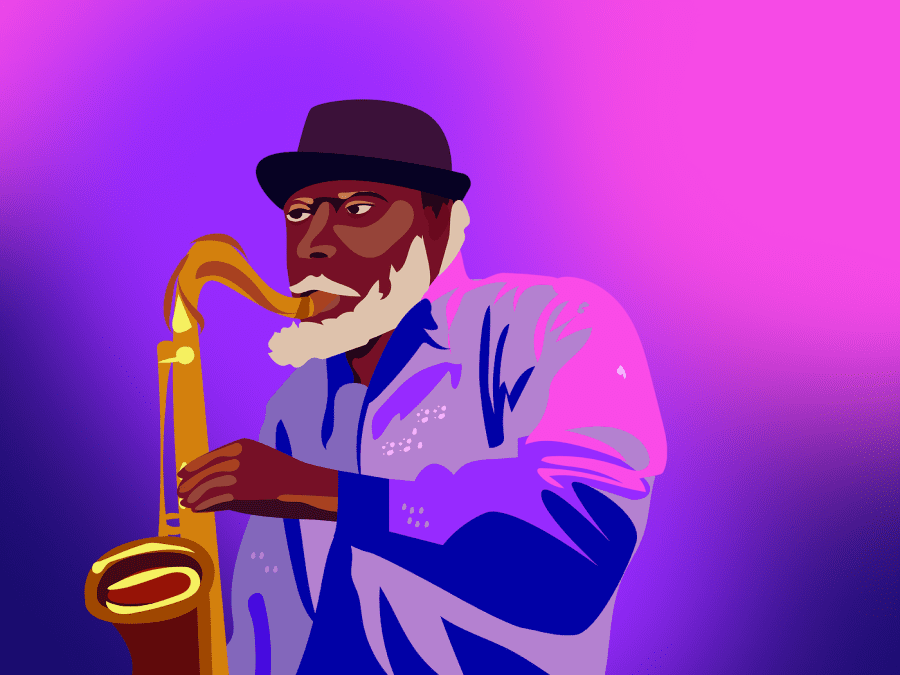Reflecting on the avant-garde jazz legacy of Pharoah Sanders
The saxophonist and composer shattered conventions on an over 60-year hot streak.
Beyond a saxophonist and composer, Pharoah Sanders was also a great collaborator and a truly selfless artist. (Illustration by Susan Behrends Valenzuela)
October 3, 2022
Legendary saxophonist and composer Pharoah Sanders died at 81 on Saturday, Sept. 24. His passing marks the loss of one of jazz’s most singular pioneering voices, as well as one of the last remaining living legends of his era. Sanders’ particular avenue of jazz mysticism allowed him to work with some of the similarly spiritually inspired giants of his time, such as Alice Coltrane, Sun Ra and his Arkestra, and perhaps most memorably, John Coltrane.
In John Coltrane’s later years, Sanders was a close friend and a member of his legendary final quintet. He learned from the master, as well as taught him in his own right. Sanders has been widely credited with influencing John Coltrane’s later style, and pushed him further into the freeform avant-garde jazz landscape. This became a hallmark of the work leading up to his untimely death in 1967 at age 40. The pair collaborated on legendary records, such as “Ascension,” “Om” and “Meditations,” where Sanders honed his unique understanding of the saxophone’s potential and Coltrane pushed himself to the outermost limits of the genre.
Following John Coltrane‘a death, Sanders produced a fruitful trio of records with his wife, Alice Coltrane. These records came at a crucial time in her career, charting her progression from a widowed member of her late husband’s band to a revered iconoclast figure. Her interests in Hinduism led her to produce the epochal “Journey in Satchidananda” — notably credited as Alice Coltrane featuring Sanders — which became a bellwether of the spiritual jazz movement of the 1970s.
The hypnotic titular track is a prime time capsule of the immense power of the height of their collaboration. Alice Coltrane’s dizzying harp duets with a lovingly restrained performance from Sanders, all laid over a sea of mesmerizing tanpura and clangingly non-rhythmic percussion. The result is an enveloping, glowing and magical moment captured on tape — a transgressive post-genre piece of boundary crossing unfathomably ahead of its time.
Producing more than 30 records under his name, Sanders was as adept a bandleader and soloist as he was an inspiring and nurturing collaborator. His legendary and nearly 10-year run of records on Impulse! Records saw him explore every avenue of his sound, ranging from the cool, psychedelic feel of “Astral Traveling” off of 1971’s “Thembi,” to the bone-chilling “To John” on 1974’s “Love In Us All.” This 1974 track, which begins as a winding gust of abrupt stops and starts, morphs into a hellish cacophony in which Sander’s tenor saxophone is almost indistinguishable from the sound of anguished screams. It is an auditory death rattle — an apocalyptic 20-minute marathon solo that burns like a brutal elegy to his mentor and friend.
In 2021, Sanders collaborated with British electronic producer Floating Points and the London Symphony Orchestra for his first major release in nearly 20 years, and what turned out to be his swan song. “Promises,” a 46-minute, nine-movement symphony, surpassed all expectations to become a critical darling and one of the year’s most widely celebrated records. It’s not everyday that a slow-burn, multi-part jazz-symphonic performance places high on the year-end lists of nearly every major music publication. The record itself is a dazzling masterpiece and a stunning display of Sanders’ mastery in the hands of a distinctly 21st century composer. Arriving 56 years into his career, it is without a doubt one of his finest and most expansive works.
Despite his incredibly decorated career and a life spent brushing shoulders with legends, Sanders remained, above all, a truly selfless artist. In a 2003 interview with All About Jazz, he said “I just want a band and to keep them working, people that I like and who I think a lot of. Once my band is happy, then I am happy.”
His low-key attitude means that in some circles, Sanders is highly regarded, yet in others, completely unsung. One of music’s most chameleonic players, he created for the love of others and his world. He has left behind a staggering legacy that more than attests to his nurturing and humble spirit.
Contact Holden Lay at [email protected].























































































































































